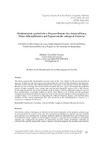Please use this identifier to cite or link to this item:
https://accedacris.ulpgc.es/jspui/handle/10553/135677
| Title: | Mediterranean symbols for a Hispano-Roman city: Artemis/Diana, Pallas-Athena/Minerva and Pegasus on the coinage of Emporiae | Other Titles: | Mediterranean symbols for a Hispano-Roman city: Artemis/Diana, Pallas-Athena/Minerva and Pegasus on the coinage of Emporiae | Authors: | Gozalbes García, Helena | UNESCO Clasification: | 550401 Historia antigua 550506 Numismática |
Keywords: | Numismatics Iconology Cultural Identity Ampurias Hispano-Roman Municipium |
Issue Date: | 2025 | Journal: | Vegueta: Anuario de la Facultad de Geografía e Historia | Abstract: | This study analyses the dissemination of icons used on the coins minted by the provincial mint of
Emporiae. To this end, the study delves into aspects that have received little attention in the literature.
The first section explores the different phases that took place in the territory where the Hispano-
Roman city was to emerge. The second section examines the main aspects that shaped the projection
process of these monetary icons, taking into consideration important aspects such as the absence
of the imperial portrait, the closest parallels of these images, and the epigraphic elements used in
their dissemination. A detailed analysis of all the above allows us to conclude that the particular
iconological-monumental selections made by Emporiae had the sole objective of showcasing the city’s
complex nature, as it succeeded in integrating the different Hispanic, Roman, and Mediterranean
identities of the various populations that were involved in the establishment of Emporiae as a
municipium in Hispania Tarraconensis. Este estudio analiza el fenómeno de difusión de los iconos adoptados en las monedas acuñadas por la ceca provincial de Emporiae. Para ello, esta aportación profundiza en aspectos que han recibido poca atención en la investigación. El primer apartado explora las diferentes fases que tuvieron lugar en el territorio donde surgiría la ciudad hispano-romana. La segunda parte examina los principales aspectos que configuraron el proceso de proyección de estos íconos monetarios, tomando en consideración aspectos importantes como la ausencia del retrato imperial, los paralelos más estrechos de estas imágenes y los elementos epigráficos utilizados en su difusión. El análisis detallado de todo ello permite concluir que la particular selección iconológico-monumental elegida por Emporiae tuvo como único objetivo mostrar el carácter complejo de la ciudad, ya que logró integrar las diferentes identidades hispánicas, romanas y mediterráneas de las distintas poblaciones que participaron en el proceso de promoción de Emporiae como un municipium de la Hispania Tarraconensis. |
URI: | https://accedacris.ulpgc.es/handle/10553/135677 | ISSN: | 2341-1112 | DOI: | 10.51349/veg.2025.1.12 | Source: | Vegueta: Anuario de la Facultad de Geografía e Historia [ISSN 1133-598X, eISSN 2341-1112], v. 25, nº 1, p. 297-329, (Enero 2025) |
| Appears in Collections: | Artículos |
Page view(s)
32
checked on Feb 22, 2025
Download(s)
13
checked on Feb 22, 2025
Google ScholarTM
Check
Altmetric
Share
Export metadata
Items in accedaCRIS are protected by copyright, with all rights reserved, unless otherwise indicated.
